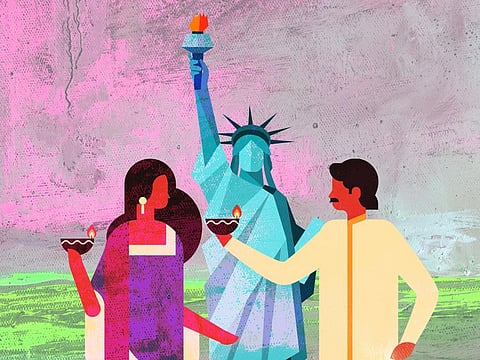Why Hinduphobia is a myth
Hindus living in the West are not a discriminated minority by any stretch of imagination

A new term, ’Hinduphobia’, is being pushed to find space for it in the sociopolitical discourse. The term is still new and yet to get a definitional clarity but is often used among a group of powerful Hindu diaspora living in the West. So, it is essential to understand and analyse the newfound importance of this term.
Has there been increased discrimination and hatred against Hindus in the West in recent years? Or, the myth of Hinduphobia is being created to use it as a red herring by a political group to protect itself from genuine criticism?
Many immigrants experience discrimination. They are usually discriminated against in housing, education, and the job market. So, it is not unusual that a Hindu immigrant living in the West feels discriminated against.
However, the question is whether that perceived discrimination is for being an immigrant or for being a Hindu. The answer to it is important to judge the veracity of this growing claim over the rising Hinduphobia.
A model minority
As an immigrant living in Europe for over three decades and a considerable time in North America, I have faced discrimination in many forms. Still, I can’t recollect a single instance where I have been targeted because of being a practicing Hindu.
In recent decades, Hindus living in the West have been branding themselves as a model minority with the right values. It is a fact that they have achieved greater professional and financial success compared to other immigrants, even to natives.
Out of nearly 1.2 billion Hindu population, 1.1 billion of them live in India alone, constituting 80% of the country’s population. The other Hindu majority country, Nepal, hosts approximately another 25 million Hindus. While only 6% of Hindus live as minorities in different countries, there are nearly 2.2 million Hindus in North America and 1.3 million in Western Europe.
Hindus living in the West never miss any opportunity to note that Hindus are heading tech giants like Microsoft and Google. They also say that the American Vice President’s mother was a Hindu.
In the UK, one Hindu is a Home Secretary, and another is Chancellor of the Exchequer. Many Hindus have been elected to important political positions in the West, and their number is growing.
A Pew Research Center survey in 2012 had found out that Hindu-Americans have the highest socioeconomic levels compared to any other religious groups in the US.
It is another matter that most of these Hindu immigrants have come from the Upper Caste background with a long history of socioeconomic advantages in India.
A 2017 Pew Survey also finds that Americans have developed much warmer feelings towards Hindus than its 2014 Survey, which was neutral. So, why is this newfound extra-interest to project Hinduphobia as a real problem, particularly in the US?
A few months ago, in April 2021, a one-day conference was organised at the Rutgers University by a group claiming to represent Hindu students to define ‘Hinduphobia’.
It has come up with a working definition: “Hinduphobia is a set of antagonistic, destructive, and derogatory attitudes and behaviours towards Sanatana Dharma (Hinduism) and Hindus that may manifest as prejudice, fear, or hatred.”
Targeted due to colour
Are Hindus really targeted in the West because they are Hindus? A major survey of Indian-Americans in 2020 by the Carnegie Endowment for International Peace finds that though Indian-Americans have experienced increasing discrimination, they also say that Latinos, LGBTQ, Africans, Women, and other Asians are discriminated against more than them. More importantly, Indian-Americans feel primarily discriminated against because of their skin colour, not their religion.
There is no doubt that minorities are in general vulnerable to the majority population in society. Thus minorities need to be protected from discrimination, prosecution, or hostility. However, these minority rights don’t provide any privilege but offer a minimum level of equality.
As the various surveys and the socioeconomic and political metrics suggest, the Hindus living in the West are not a discriminated minority.
Hindus in the West don’t face any social or institutional threat to carry out their religious activities as some other minorities do. White supremacists don’t attack Hindus or their places of worship. It is rare to find any Western politicians or academics critical of Hindus.
A politically manufactured myth
There is no doubt that Hinduphobia in the West is a politically manufactured myth. It is only invented by a politically active Hindu diaspora group to insulate the BJP government in India from the criticism against its rising chauvinism.
The political project of creating an imaginary bogey of Hinduphobia also provides ammunition to the upper caste dominated diaspora to throttle the debate within the Hindu community against the regressive caste system and other forms of anti-science superstitious practices. The ‘Hinduphobia’ epithet is primarily used to silence the voices of ‘reformist’ Hindus advocating for inclusivity.
Minority rights are of paramount importance. However, it should not be misused by a privileged minority group to legitimise its persecution of others. The world needs to remain aware that Hinduphobia is a myth created by a political project.
The fear of being accused of it should not shield any group from continuing its caste-based oppression and minority domination in India.








